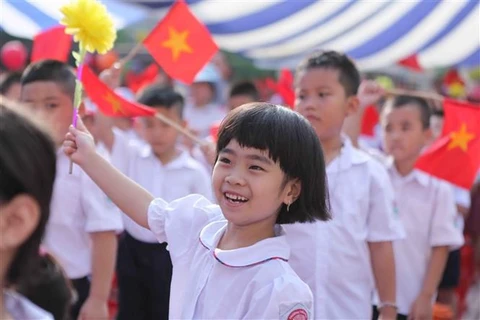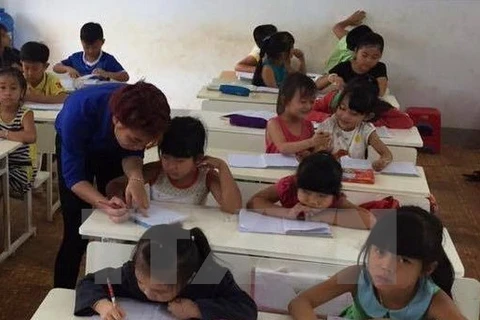 Nicholas Booth, policy adviser for governance, access to justice and human rights at UNDP in Vietnam, speaks at the workshop on December 8 (Photo: VNA)
Nicholas Booth, policy adviser for governance, access to justice and human rights at UNDP in Vietnam, speaks at the workshop on December 8 (Photo: VNA) Can Tho (VNA) – The Foreign Ministry and the UN Development Programme (UNDP) in Vietnam held a workshop in Can Tho city on December 8 to inform the implementation of the 2nd-cycle Universal Periodic Review (UPR) recommendations accepted by Vietnam.
UPR, an inter-governmental mechanism of the Human Rights Council, reviews human rights issues in all UN member states. It is based on the principles of dialogue, cooperation, equality, objectivity, and transparency with the aim of improving and promoting the implementation of obligations and commitments on human rights. Vietnam went through the first UPR in May 2009.
Speaking at the workshop, Vu Quang Anh, Director of the Foreign Ministry’s Department of International Organisations, said after accepting 182 recommendations on human rights made by UN member states in February 2014, Vietnam assigned ministries and sectors to seriously implement the recommendations.
At present, 147 of the 182 accepted recommendations have been implemented while four others have been partly carried out. Notably, Vietnam ratified the Convention on the Rights of Persons with Disabilities and the Convention against Torture and Other Cruel, Inhuman or Degrading Treatment or Punishment. It also approved dozens of important legal documents relating to human rights and citizens’ rights so as to concretise the 2013 Constitution in line with international conventions to which Vietnam is a party.
[Vietnam realises commitments to human rights promotion]
The country has also improved public awareness of human rights in all fields, including politics, economy, society and culture, he noted, adding that it is effectively implementing many national programmes to protect vulnerable groups’ interests such as the national action programmes on gender equality, the elderly, and children.
It has fully implemented policies targeting persons subject to social protection, particularly children, the elderly, and the disabled. Meanwhile, authorised agencies have also supported residents in areas suffering from natural disasters, drought, saltwater intrusion, and pollution.
As a result, average per capita income increased from 1,900 USD in 2013 to 2,215 USD in 2016, Anh said.
Nicholas Booth, policy adviser for governance, access to justice and human rights at UNDP in Vietnam, said the UN highly values Vietnam’s coordination with human rights agencies in realising the recommendations and improving the UPR process.
However, the UN realises that the country is facing many challenges to the recommendation implementation such as asynchronous legal system, limited resources for social welfare programmes, and overloading at sectors and authorities which have to carry out the recommendations and many other tasks at the same time.
Booth asked Vietnam to maximise agencies’ responsibility in independently implementing the recommendations and ensure sufficient financial and human resources for the work. Particularly, it needs to form close and sustainable partnership between local administrations and social and civil organisations to effectively implement the UPR process.
At the workshop, participants also discussed the focus and orientations for the implementation of the 3rd-cycle UPR recommendations in the time ahead.-VNA
VNA
























